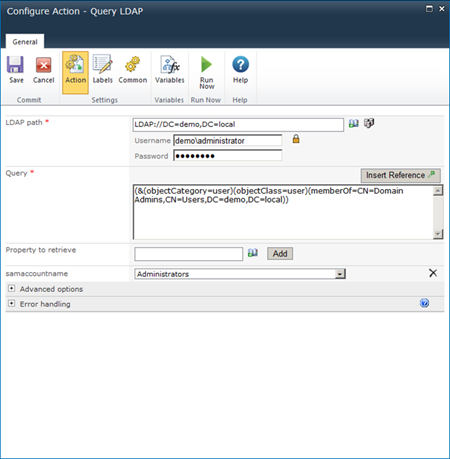How to Handle Environment Variables with Nintex Workflow
A topic you sure will run across is how to handle environment variables when you deploy workflows designed with Nintex Workflow. The values are by definition just valid for one specific environment, and have to be changed in order to deploy the workflow into another environment. Example for environment variables are URLs of web services or service accounts, which are different between development, test and production system.
Basically, there are three ways how you can handle this information:
Basically, there are three ways how you can handle this information:
- store the information within the workflow activity
- create a workflow variable
- create a workflow constant
Most people start with alternative 1. The environment specific information is directly configured on the workflow activities. This has one advantage: You are pretty fast when you configure the activities the first time. But in the long run the disadvantages outweigh. After deploying the workflow from environment to the next stage, you have to update all affected activities. Beside the fact that this is time-killing, it is also error-prone. Furthermore, such a workflow requires some effort if you put it under source control. For every functional change you implement, you have to update all workflow variants (e.g. for development, test, production).
 |
| Alternative 1: Configuration values are set in the workflow activity. |
With alternative 2 you will set the workflow variables carrying the environment specific information to the beginning of the workflow. So you do not have to scan the complete workflow for activities that require an update. Consequently, the risk of a faulty configuration is also mitigated. But you still have the issue, that you have a workflow variant for each environment which has to be maintained in the source code management system. And this method cannot be applied to credentials for service accounts.
 |
| Alternative 2: Configuration value is set in the beginning of the workflow. |
The issue that you have to maintain a variant for every environment is resolved with alternative 3. In this solution you create a workflow constant for every environment information your workflow requires. Therefore the workflow does not have to be altered when you deploy it into another environment.
 |
| Alternative 3: Configuration values are set with workflow constants. |
How workflow constants can be created using a script will be featured in my next post.


Hi,
ReplyDeleteI have defined project manager by creating a workflow variable. The workflow starts and the variable is filled with one id. some time later IT changes the login id/display name of that project manager due to this the workflow terminates with an error. "An error has occured". It cannot find that person. I
Is there any way to change the approver id from old to new for a running workflow?
Can I change the workflow variable value in the middle of a running workflow?
Thanks
Regards,
Siskin
Hi Siskin,
Deletein general the workflow should fill the variable as late as possible. The best would be just before the activity where it is required. This should mitigate the issue.
If you need the information from the variable in multiple activities than you should fill it from another data source every time you need it. This can be done with a workflow constant or by saving the information in a SharePoint list. If you change the information stored in one of those, the workflow can use the most current information when it needs it.
There is no way to update the value of a workflow variable from outside the workflow. The workflow has to pull the information himself.
Please let me know if this answers your questions.